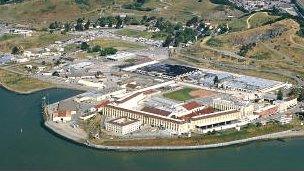San Quentin's Silicon Valley: From inmate to entrepreneur
- Published

Could the next Mark Zuckerberg be sitting in a California prison?
The participants of a pioneering initiative at San Quentin correctional facility certainly hope so.
The Last Mile programme at San Quentin aims to educate inmates about social media, technology and entrepreneurship.
Each must develop a business idea that combines technology with a good cause and eventually pitch it to an audience of Silicon Valley bosses and executives.
The catch? They can't use the internet (and many of them never have).
The programme is the brainchild of its financial backer, Chris Redlitz, entrepreneur and founding partner of new-media venture fund Transmedia Capital.
Shocked by California's recidivism rate of 65% and an annual cost per prisoner of $45,000 (£30,000), he decided to look at the problem as a business challenge.
"I put my investor hat on and said, 'that's a bad return on investment'. Frankly, we're all paying taxes and the prison system is a huge drain on them today," he says.
Second chance 'earned'
The figures back up his claims. California's budget for corrections and rehabilitation has risen by 10% this year, while spending on business, transportation and housing has been cut by 21%.
The state predicts that it will spend $8.9bn on its corrections system from 2012-13, only fractionally less than its budget for higher education.
But Mr Redlitz says the programme is as much a social cause as a financial one.
"It started as a business problem, but none of us realised the passion and desire for an opportunity that these guys have. There's a lot of talent inside those walls."
Some of the participants are guilty of serious crimes, such as murder, but Mr Redlitz insists that they have earned a second chance.
"You have to look a little deeper than what the conviction is for. We have to understand what these guys have done in prison to get to this stage.
"Everyone admitted to the programme has to go through rigorous qualification and must be recommended by peers and the administration. It's tough to get in."
'Tweet sheets'
Facebook wasn't even a twinkle in Mark Zuckerberg's eye when some of the men went inside, but the programme tries to acclimatise them to social media.
Instead of internet access the men are provided with "tweet sheets" so that they can ask and answer questions on Twitter by longhand.
Each inmate also has a profile on the question-and-answer social network Quora. Members of the public have been asking questions about what life is like in San Quentin, and the responses have been enlightening and often moving.
Reformed criminals have a lot to offer the world of business, according to Liam Black. He is one of the UK's best known social entrepreneurs and was a key figure at Jamie Oliver's Fifteen, a restaurant chain that aims to turn disadvantaged young people into chefs.
"A friend of mine says that reformed cocaine dealers are some of his best employees. They understand money, they're great at making a deal - they just don't use those skills for nefarious purposes any more," he says.
"We need a society that isn't just punishing, it should be rehabilitating, and I don't want my taxes paying for people going in and out of prison. Whether you look at it as a cuddly liberal or from the rabid right, it makes sense to try to help these people."
Life changing
Tulio Cardozo knows just how valuable that help is. In 2005 he was sentenced to nearly six years in prison for manufacturing a controlled substance.
"I made a terrible decision and went with somebody on a trip to manufacture hashish and the room we were in blew up. I suffered third-degree burns on 47% of my body," he says.
He ended up at San Quentin where, thanks to the help on offer there, he began to turn his life around.
"Had I not had the classes and the opportunity to learn, I don't think I'd be having this conversation now. They gave me the self-belief to prove that I'm more than the sum of my actions."
He spent hours reading books about how to program computer software despite not having access to a computer. He now has an internship at KickLabs, a San Francisco company that helps technology start-ups find their feet in the marketplace.
On 18 May his rehabilitation took another step forward when he returned to San Quentin for the first time since his release, to hear participants of the Last Mile programme pitch their business ideas.
In 1969 Johnny Cash played at San Quentin and sang: "San Quentin what good do you think you do/Do you think I'll be different when you're through?" to the applause of prisoners.
More than 40 years later, Tulio Cardozo and others like him hope to show that things have changed.
- Published20 January 2012
- Published26 April 2011